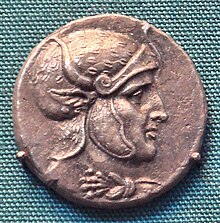This is an old revision of this page, as edited by NoLegMan (talk | contribs) at 17:44, 22 August 2018 (→Syria). The present address (URL) is a permanent link to this revision, which may differ significantly from the current revision.
Revision as of 17:44, 22 August 2018 by NoLegMan (talk | contribs) (→Syria)(diff) ← Previous revision | Latest revision (diff) | Newer revision → (diff)Calendar year
| Millennium: | 1st millennium BC |
|---|---|
| Centuries: | |
| Decades: | |
| Years: |
| 305 BC by topic |
| Politics |
|---|
| Categories |
| Gregorian calendar | 305 BC CCCV BC |
| Ab urbe condita | 449 |
| Ancient Egypt era | XXXIII dynasty, 19 |
| - Pharaoh | Ptolemy I Soter, 19 |
| Ancient Greek era | 118th Olympiad, year 4 |
| Assyrian calendar | 4446 |
| Balinese saka calendar | N/A |
| Bengali calendar | −897 |
| Berber calendar | 646 |
| Buddhist calendar | 240 |
| Burmese calendar | −942 |
| Byzantine calendar | 5204–5205 |
| Chinese calendar | 乙卯年 (Wood Rabbit) 2393 or 2186 — to — 丙辰年 (Fire Dragon) 2394 or 2187 |
| Coptic calendar | −588 – −587 |
| Discordian calendar | 862 |
| Ethiopian calendar | −312 – −311 |
| Hebrew calendar | 3456–3457 |
| Hindu calendars | |
| - Vikram Samvat | −248 – −247 |
| - Shaka Samvat | N/A |
| - Kali Yuga | 2796–2797 |
| Holocene calendar | 9696 |
| Iranian calendar | 926 BP – 925 BP |
| Islamic calendar | 954 BH – 953 BH |
| Javanese calendar | N/A |
| Julian calendar | N/A |
| Korean calendar | 2029 |
| Minguo calendar | 2216 before ROC 民前2216年 |
| Nanakshahi calendar | −1772 |
| Seleucid era | 7/8 AG |
| Thai solar calendar | 238–239 |
| Tibetan calendar | 阴木兔年 (female Wood-Rabbit) −178 or −559 or −1331 — to — 阳火龙年 (male Fire-Dragon) −177 or −558 or −1330 |

Year 305 BC was a year of the pre-Julian Roman calendar. At the time, it was known as the Year of the Consulship of Megellus and Augurinus (or, less frequently, year 449 Ab urbe condita). The denomination 305 BC for this year has been used since the early medieval period, when the Anno Domini calendar era became the prevalent method in Europe for naming years.
Events
By place
Seleucid Empire
- Seleucus, former officer of Alexander the Great, considers himself emperor of Persia. He attempts to recover lands taken by Chandragupta that had been a part of Alexander's Empire. Seleucus establishes Seleucia on the Tigris River as his capital.
Syria
- Antigonus I Monophthalmus sends his son Demetrius to initiate the ] the city has refused him armed support against Ptolemy. He shows ingenuity in devising new siege engines in his unsuccessful attempt to reduce the city. Among his creations are a battering ram 60 metres long and requiring 1,000 men to operate it and a wheeled siege tower named "Helepolis" (or "Taker of Cities") which stands 40 metres tall and 20 metres wide and weighs 180 tons. This siege of Rhodes earns Demetrius the title Poliorcetes ("the City Besieger").
Roman Republic
- The Roman consuls, Marcus Fulvius Curvus Paetinus and Lucius Postumius Megellus, decisively defeat the Samnites in the Battle of Bovianum to end the Second Samnite War.
Births
- Zou Yan, Chinese philosopher (d. 240 BC)